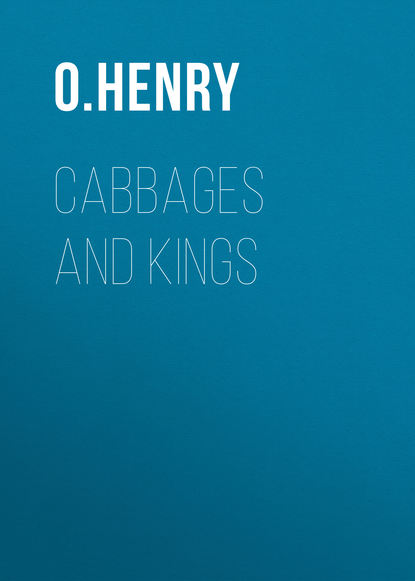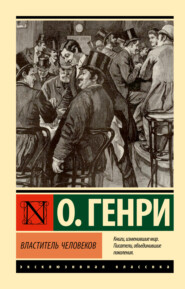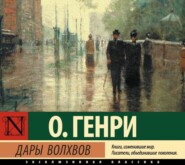По всем вопросам обращайтесь на: info@litportal.ru
(©) 2003-2025.
✖
Cabbages and Kings
Настройки чтения
Размер шрифта
Высота строк
Поля
"The main street ran along the beach, and I walked down it, and then turned up a kind of lane where the houses were made of poles and straw. I wanted to see what the monkeys did when they weren't climbing cocoanut trees. The very first shack I looked in I saw my people. They must have come ashore while I was promenading. A man about fifty, smooth face, heavy eyebrows, dressed in black broadcloth, looking like he was just about to say, 'Can any little boy in the Sunday school answer that?' He was freezing on to a grip that weighed like a dozen gold bricks, and a swell girl – a regular peach, with a Fifth Avenue cut – was sitting on a wooden chair. An old black woman was fixing some coffee and beans on a table. The light they had come from a lantern hung on a nail. I went and stood in the door, and they looked at me, and I said:
"'Mr. Wahrfield, you are my prisoner. I hope, for the lady's sake, you will take the matter sensibly. You know why I want you.'
"'Who are you?' says the old gent.
"'O'Day,' says I, 'of the Columbia Detective Agency. And now, sir, let me give you a piece of good advice. You go back and take your medicine like a man. Hand 'em back the boodle; and maybe they'll let you off light. Go back easy, and I'll put in a word for you. I'll give you five minutes to decide.' I pulled out my watch and waited.
"Then the young lady chipped in. She was one of the genuine high-steppers. You could tell by the way her clothes fit and the style she had that Fifth Avenue was made for her.
"'Come inside,' she says. 'Don't stand in the door and disturb the whole street with that suit of clothes. Now, what is it you want?'
"'Three minutes gone,' I said. 'I'll tell you again while the other two tick off.
"'You'll admit being the president of the Republic, won't you?'
"'I am,' says he.
"'Well, then,' says I, 'it ought to be plain to you. Wanted, in New York, J. Churchill Wahrfield, president of the Republic Insurance Company.
"'Also the funds belonging to said company, now in that grip, in the unlawful possession of said J. Churchill Wahrfield.'
"'Oh-h-h-h!' says the young lady, as if she was thinking, 'you want to take us back to New York?'
"'To take Mr. Wahrfield. There's no charge against you, miss. There'll be no objection, of course, to your returning with your father.'
"Of a sudden the girl gave a tiny scream and grabbed the old boy around the neck. 'Oh, father, father!' she says, kind of contralto, 'can this be true? Have you taken money that is not yours? Speak, father!' It made you shiver to hear the tremolo stop she put on her voice.
"The old boy looked pretty bughouse when she first grappled him, but she went on, whispering in his ear and patting his off shoulder till he stood still, but sweating a little.
"She got him to one side and they talked together a minute, and then he put on some gold eyeglasses and walked up and handed me the grip.
"'Mr. Detective,' he says, talking a little broken, 'I conclude to return with you. I have finished to discover that life on this desolate and displeased coast would be worse than to die, itself. I will go back and hurl myself upon the mercy of the Republic Company. Have you brought a sheep?'
"'Sheep!' says I; 'I haven't a single – '
"'Ship,' cut in the young lady. 'Don't get funny. Father is of German birth, and doesn't speak perfect English. How did you come?'
"The girl was all broke up. She had a handkerchief to her face, and kept saying every little bit, 'Oh, father, father!' She walked up to me and laid her lily-white hand on the clothes that had pained her at first. I smelt a million violets. She was a lulu. I told her I came in a private yacht.
"'Mr. O'Day,' she says. 'Oh, take us away from this horrid country at once. Can you! Will you! Say you will.'
"'I'll try,' I said, concealing the fact that I was dying to get them on salt water before they could change their mind.
"One thing they both kicked against was going through the town to the boat landing. Said they dreaded publicity, and now that they were going to return, they had a hope that the thing might yet be kept out of the papers. They swore they wouldn't go unless I got them out to the yacht without any one knowing it, so I agreed to humour them.
"The sailors who rowed me ashore were playing billiards in a bar-room near the water, waiting for orders, and I proposed to have them take the boat down the beach half a mile or so, and take us up there. How to get them word was the question, for I couldn't leave the grip with the prisoner, and I couldn't take it with me, not knowing but what the monkeys might stick me up.
"The young lady says the old coloured woman would take them a note. I sat down and wrote it, and gave it to the dame with plain directions what to do, and she grins like a baboon and shakes her head.
"Then Mr. Wahrfield handed her a string of foreign dialect, and she nods her head and says, 'See, señor,' maybe fifty times, and lights out with the note.
"'Old Augusta only understands German,' said Miss Wahrfield, smiling at me. 'We stopped in her house to ask where we could find lodging, and she insisted upon our having coffee. She tells us she was raised in a German family in San Domingo.'
"'Very likely,' I said. 'But you can search me for German words, except nix verstay and noch einst. I would have called that "See, señor" French, though, on a gamble.'
"Well, we three made a sneak around the edge of town so as not to be seen. We got tangled in vines and ferns and the banana bushes and tropical scenery a good deal. The monkey suburbs was as wild as places in Central Park. We came out on the beach a good half mile below. A brown chap was lying asleep under a cocoanut tree, with a ten-foot musket beside him. Mr. Wahrfield takes up the gun and pitches it into the sea. 'The coast is guarded,' he says. 'Rebellion and plots ripen like fruit.' He pointed to the sleeping man, who never stirred. 'Thus,' he says, 'they perform trusts. Children!'
"I saw our boat coming, and I struck a match and lit a piece of newspaper to show them where we were. In thirty minutes we were on board the yacht.
"The first thing, Mr. Wahrfield and his daughter and I took the grip into the owner's cabin, opened it up, and took an inventory. There was one hundred and five thousand dollars, United States treasury notes, in it, besides a lot of diamond jewelry and a couple of hundred Havana cigars. I gave the old man the cigars and a receipt for the rest of the lot, as agent for the company, and locked the stuff up in my private quarters.
"I never had a pleasanter trip than that one. After we got to sea the young lady turned out to be the jolliest ever. The very first time we sat down to dinner, and the steward filled her glass with champagne – that director's yacht was a regular floating Waldorf-Astoria – she winks at me and says, 'What's the use to borrow trouble, Mr. Fly Cop? Here's hoping you may live to eat the hen that scratches on your grave.' There was a piano on board, and she sat down to it and sung better than you give up two cases to hear plenty times. She knew about nine operas clear through. She was sure enough bon ton and swell. She wasn't one of the 'among others present' kind; she belonged on the special mention list!
"The old man, too, perked up amazingly on the way. He passed the cigars, and says to me once, quite chipper, out of a cloud of smoke, 'Mr. O'Day, somehow I think the Republic Company will not give me the much trouble. Guard well the gripvalise of the money, Mr. O'Day, for that it must be returned to them that it belongs when we finish to arrive.'
"When we landed in New York I 'phoned to the chief to meet us in that director's office. We got in a cab and went there. I carried the grip, and we walked in, and I was pleased to see that the chief had got together that same old crowd of moneybugs with pink faces and white vests to see us march in. I set the grip on the table. 'There's the money,' I said.
"'And your prisoner?' said the chief.
"I pointed to Mr. Wahrfield, and he stepped forward and says:
"'The honour of a word with you, sir, to explain.'
"He and the chief went into another room and stayed ten minutes. When they came back the chief looked as black as a ton of coal.
"'Did this gentleman,' he says to me, 'have this valise in his possession when you first saw him?'
"'He did,' said I.
"The chief took up the grip and handed it to the prisoner with a bow, and says to the director crowd: 'Do any of you recognize this gentleman?'
"They all shook their pink faces.
"'Allow me to present,' he goes on, Señor Miraflores, president of the republic of Anchuria. The señor has generously consented to overlook this outrageous blunder, on condition that we undertake to secure him against the annoyance of public comment. It is a concession on his part to overlook an insult for which he might claim international redress. I think we can gratefully promise him secrecy in the matter.'
"They gave him a pink nod all round.
"'O'Day,' he says to me. 'As a private detective you're wasted. In a war, where kidnapping governments is in the rules, you'd be invaluable. Come down to the office at eleven.'
"I knew what that meant.
"'So that's the president of the monkeys,' says I. 'Well, why couldn't he have said so?'
"Wouldn't it jar you?"
XVIII
THE VITAGRAPHOSCOPE

















